- Home
- Block, Lawrence
Hard Case Crime: Getting Off
Hard Case Crime: Getting Off Read online
BY LAWRENCE BLOCK
WRITING AS JILL EMERSON
WARM AND WILLING
ENOUGH OF SORROW
THIRTY
THREESOME
A MADWOMAN’S DIARY
THE TROUBLE WITH EDEN
A WEEK AS ANDREA BENSTOCK
GETTING OFF
OTHER HARD CASE CRIME NOVELS
BY LAWRENCE BLOCK
A DIET OF TREACLE
THE GIRL WITH THE LONG GREEN HEART
GRIFTER’S GAME
KILLING CASTRO
LUCKY AT CARDS
Getting OFF
A NOVEL OF SEX AND VIOLENCE
by Lawrence Block
WRITING AS JILL EMERSON
A HARD CASE CRIME BOOK
(HCC-101)
First Hard Case Crime edition: September 2011
Published by
Titan Books
A division of Titan Publishing Group Ltd
144 Southwark Street
London SE1 0UP
in collaboration with Winterfall LLC
If you purchased this book without a cover, you should know that it is stolen property. It was reported as “unsold and destroyed” to the publisher, and neither the author nor the publisher has received any payment for this “stripped book.”
Copyright © 2011 by Lawrence Block. Portions of Getting Off appeared in somewhat different form in the anthologies Manhattan Noir, edited by Lawrence Block; Bronx Noir, edited by S. J. Rozan; Indian Country Noir, edited by Sarah Cortez & Liz Martinez; and Warriors, edited by George R. R. Martin and Gardner Dozois.
Cover painting copyright © 2011 by Gregory Manchess.
All rights reserved. No part of this book may be reproduced or transmitted in any form or by any electronic or mechanical means, including photocopying, recording or by any information storage and retrieval system, without the written permission of the publisher, except where permitted by law.
This book is a work of fiction. Names, characters, places, and incidents either are the products of the author’s imagination or are used fictitiously, and any resemblance to actual events or persons, living or dead, is entirely coincidental.
Print edition ISBN 978-0-85768-287-1
E-book ISBN 978-0-85768-599-5
Design direction by Max Phillips
www.maxphillips.net
Typeset by Swordsmith Productions
The name “Hard Case Crime” and the Hard Case Crime logo are trademarks of Winterfall LLC. Hard Case Crime books are selected and edited by Charles Ardai.
Printed in the United States of America
Visit us on the web at www.HardCaseCrime.com
for CHARLES ARDAI
Contents
Chapter One
Chapter Two
Chapter Three
Chapter Four
Chapter Five
Chapter Six
Chapter Seven
Chapter Eight
Chapter Nine
Chapter Ten
Chapter Eleven
Chapter Twelve
Chapter Thirteen
Chapter Fourteen
Chapter Fifteen
Chapter Sixteen
Chapter Seventeen
Chapter Eighteen
Chapter Nineteen
Chapter Twenty
Chapter Twenty-One
Chapter Twenty-Two
Chapter Twenty-Three
Chapter Twenty-Four
Chapter Twenty-Five
Chapter Twenty-Six
Chapter Twenty-Seven
Chapter Twenty-Eight
Chapter Twenty-Nine
Chapter Thirty
Chapter Thirty-One
Chapter Thirty-Two
Chapter Thirty-Three
ONE
Pronouns suited her.
She, her, herself. These worked just fine. Names came and went, you were out the door and on a plane or a train or a bus, and your name stayed behind, along with whatever else you didn’t need anymore.
Once, in a man’s apartment, a book caught her eye. The title was She, by H. Rider Haggard, and she plucked it from the shelf and opened it at random. She read this passage:
Oh, how beautiful she looked there in the flame! No angel out of heaven could have worn a greater loveliness. Even now my heart faints before the recollection of it, as naked in the naked fire she stood and smiled at our awed faces, and I would give half my remaining time upon this earth thus to see her once again.
She might have read more, but she had to get out of there. The book’s owner was in the bedroom, as naked as the woman in the story, sprawled on his back with his sightless eyes staring at the ceiling. So she couldn’t stick around, and she wasn’t interested enough in the book to take it away with her. She’d take money, that was different, but she wouldn’t take a book, and she wiped her fingerprints from this one and returned it to its spot on the shelf.
When she was born her parents named her Katherine Anne Tolliver, and she grew up with seemingly endless variations of Katherine. Kathy, Katie, Kath, Kate.
Cat.
Kitty.
For a time, her father called her Kitten. The world shortened that to Kit, and somehow it stuck, and so he called her that as well.
Kit. Kit Tolliver.
The trouble with that, though, was that one name ran into the other, with her first name ending with the same letter that started her last name. So that someone hearing her name might think her surname was Oliver.
She still had the name when she graduated from high school. It was on her diploma, but some idiot misspelled it, left the E off her middle name. Katherine Ann Tolliver, it read, and that bothered her for about fifteen seconds. Then she realized she wouldn’t be keeping the diploma. Or the name, either.
All the same, she packed the diploma and took it with her when she moved to the Cities. She went first to a motel in Red Cloud, just to be out of Hawley, and nine days later she signed Katherine Tolliver to the lease of an apartment in St. Paul. It was a perfectly fine apartment, and she had a two-year lease, but she was gone after ten weeks. Done with the Cities, done with Minnesota altogether. Done with being Kit Tolliver.
There were plenty of other places to go, and when one was used up she never had trouble finding another. There were plenty of names, too, an endless supply of names, and she’d keep one for an hour or an evening or a week or a month.
And then get another one.
Once she took a man’s name along with his cash.
He’d given it as Les. “Les is more,” he’d told her, and laughed heartily, and it had been clear she was not the first woman to receive this assurance. And, when this particular Les was no more, she went through his wallet and discovered that his name was not Lester, as she’d more or less assumed, but Leslie. Leslie Paul Hammond was the name on his driver’s license, but on his credit cards the middle name was conveniently reduced to an initial.
Well, why not? The sexual ambiguity of the name made it easy enough, so why not let his AmEx card pay for a plane ticket, why not use his Visa to pay for a nice hotel room? It would be a while before anybody found him, and by then she’d have doubled back on her own trail, so anyone looking for her would be looking in the wrong places.
By then she’d be somewhere else. And by then she’d be somebody else.
Nothing to it.
She, by H. Rider Haggard.
She might have looked for a copy later on, but she never did. Instead she forgot about it, even as she forgot about the dead man in the other room. And all the men, and all the other rooms.
And moved on.
TWO
She felt his eyes on her just about the
time the bartender placed a Beck’s coaster on the bar and set her dry Rob Roy on top of it. She wanted to turn and see who was eyeing her, but remained as she was, trying to analyze just what it was she felt. She couldn’t pin it down physically, couldn’t detect a specific prickling of the nerves in the back of her neck. She simply knew she was being watched, and that the watcher was a male.
It was, to be sure, a familiar sensation. Men had always looked at her. Since adolescence, since her body had begun the transformation from girl to woman? No, longer than that. Even in childhood, some men had looked at her, gazing with admiration and, often, with something beyond admiration.
In Hawley, Minnesota, thirty miles east of the North Dakota line, they’d looked at her like that. The glances followed her to Red Cloud and St. Paul, and other places after that, and now she was in New York, and, no surprise, men still looked at her.
She lifted her glass, sipped, and a male voice said, “Excuse me, but is that a Rob Roy?”
He was standing to her left, a tall man, slender, well turned out in a navy blazer and gray trousers. His shirt was a button-down, his tie diagonally striped. His face, attractive but not handsome, was youthful at first glance, but she could see he’d lived some lines into it. And his dark hair was lightly infiltrated with gray.
“A dry Rob Roy,” she said. “Why?”
“In a world where everyone orders Cosmopolitans,” he said, “there’s something very pleasingly old-fashioned about a girl who drinks a Rob Roy. A woman, I should say.”
She lowered her eyes to see what he was drinking.
“I haven’t ordered yet,” he said. “Just got here. I’d have one of those, but old habits die hard.” And, when the barman moved in front of him, he ordered Jameson on the rocks. “Irish whiskey,” he told her. “Of course this neighborhood used to be mostly Irish. And tough. It was a pretty dangerous place a few years ago. A young woman like yourself wouldn’t feel comfortable walking into a bar unaccompanied, not in this part of town. Even accompanied, it was no place for a lady.”
“I guess it’s changed a lot,” she said.
“It’s even changed its name,” he said. His drink arrived, and he picked up his glass and held it to the light, admiring the amber color. “They call it Clinton now. That’s for DeWitt Clinton, not Bill. DeWitt was the governor a while back, he dug the Erie Canal. Not personally, but he got it done. And there was George Clinton, he was the governor, too, for seven terms starting before the adoption of the Constitution. And then he had a term as vice president. But all that was before your time.”
“By a few years,” she allowed.
“It was even before mine,” he said. “But I grew up here, just a few blocks from here, and I can tell you nobody called it Clinton then. You probably know what they called it.”
“Hell’s Kitchen,” she said. “They still call it that, when they’re not calling it Clinton.”
“Well, it’s more colorful. It was the real estate interests who plumped for Clinton, because they figured nobody would want to move to something called Hell’s Kitchen. And that may have been true then, when people remembered what a bad neighborhood this was, but now it’s spruced up and gentrified and yuppified to within an inch of its life, and the old name gives it a little added cachet. A touch of gangster chic, if you know what I mean.”
“If you can’t stand the heat—”
“Stay out of the Kitchen,” he supplied. “When I was growing up here, the Westies pretty much ran the place. They weren’t terribly efficient, like the Italian mob, but they were colorful and bloodthirsty enough to make up for it. There was a man two doors down the street from me who disappeared, and they never did find the body. Except one of his hands turned up in somebody’s freezer on Fifty-third Street and Eleventh Avenue. They wanted to be able to put his fingerprints on things long after he was dead and gone.”
“Would that work?”
“With luck,” he said, “we’ll never know. The Westies are mostly gone now, and the tenement apartments they lived in are all tarted up, with stockbrokers and lawyers renting them now. Which are you?”
“Me?”
“A stockbroker? Or a lawyer?”
She grinned. “Neither one, I’m afraid. I’m an actress.”
“Even better.”
“Which means I take a class twice a week,” she said, “and run around to open casting calls and auditions.”
“And wait tables?”
“I did some of that in the Cities. I suppose I’ll have to do it again here, when I start to run out of money.”
“The Cities?”
“The Twin Cities. Minneapolis and St. Paul.”
“That’s where you’re from?”
They talked about where she was from, and along the way he told her his name was Jim. She was Jennifer, she told him. He related another story about the neighborhood—he was really a pretty good storyteller—and by then her Rob Roy was gone and so was his Jameson. “Let me get us another round,” he said, “and then why don’t we take our drinks to a table? We’ll be more comfortable, and it’ll be quieter.”
He was talking about the neighborhood.
“Irish, of course,” he said, “but that was only part of it. You had blocks that were pretty much solid Italian, and there were Poles and other Eastern Europeans. A lot of French, too, working at the restaurants in the theater district. You had everything, really. The UN’s across town on the East River, but you had your own General Assembly here in the Kitchen. Fifty-seventh Street was a dividing line; north of that was San Juan Hill, and you had a lot of blacks living there. It was an interesting place to grow up, if you got to grow up, but no sweet young thing from Minnesota would want to move here.”
She raised her eyebrows at sweet young thing, and he grinned at her. Then his eyes turned serious and he said, “I have a confession to make.”
“Oh?”
“I followed you in here.”
“You mean you noticed me even before I ordered a Rob Roy?”
“I saw you on the street. And for a moment I thought—”
“What?”
“Well, that you were on the street.”
“I guess I was, if that’s where you saw me. I don’t...oh, you thought—”
“That you were a working girl. I wasn’t going to mention this, and I don’t want you to take it the wrong way—”
What, she wondered, was the right way?
“—because it’s not as though you looked the part, or were dressed like the girls you see out there. See, the neighborhood may be tarted up, but that doesn’t mean the tarts have disappeared.”
“I’ve noticed.”
“It was more the way you were walking,” he went on. “Not swinging your hips, not your walk per se, but a feeling I got that you weren’t in a hurry to get anywhere, or even all that sure where you were going.”
“I was thinking about stopping for a drink,” she said, “and not sure if I wanted to, or if I should go straight home.”
“That would fit.”
“And I’ve never been in here before, and wondered if it was decent.”
“Well, it’s decent enough now. A few years ago it wouldn’t have been. And even now, a woman alone—”
“I see.” She sipped her drink. “So you thought I might be a hooker,” she said, “and that’s what brought you in here. Well, I hate to disappoint you—”
“What brought me in here,” he said, “was the thought that you might be, and the hope that you weren’t.”
“I’m not.”
“I know.”
“I’m an actress.”
“And a good one, I’ll bet.”
“I guess time will tell.”
“It generally does,” he said. “Can I get you another one of those?”
She shook her head. “Oh, I don’t think so,” she said. “I was only going to come in for one drink, and I wasn’t even sure I wanted to do that. And I’ve had two, and that’s really plenty.”
&
nbsp; “Are you sure?”
“I’m afraid so. It’s not just the alcohol, it’s the time. I have to get home.”
“I’ll walk you.”
“Oh, that’s not necessary.”
“Yes, it is. Whether it’s Hell’s Kitchen or Clinton, it’s still necessary.”
“Well...”
“I insist. It’s safer around here than it used to be, but it’s a long way from Minnesota. And I suppose you get some unsavory characters in Minnesota, as far as that goes.”
“Well, you’re right about that,” she said. And at the door she said, “I just don’t want you to think you have to walk me home because I’m a lady.”
“I’m not walking you home because you’re a lady,” he said. “I’m walking you home because I’m a gentleman.”
The walk to her door was interesting. He had stories to tell about half the buildings they passed. There’d been a murder in this one, a notorious drunk in the next. For all that some of the stories were unsettling, she felt completely secure walking at his side.
At her door he said, “Any chance I could come up for a cup of coffee?”
“I wish,” she said.
“I see.”
“I’ve got this roommate,” she said. “It’s impossible, it really is.
My idea of success isn’t starring on Broadway, it’s making enough money to have a place of my own. There’s just no privacy when she’s home, and the damn girl is always home.”
“That’s a shame.”
She drew a breath. “Jim? Do you have a roommate?”
*
He didn’t, and if he had the place would still have been large enough to afford privacy. A large living room, a big bedroom, a good-sized kitchen. Rent-controlled, he told her, or he could never have afforded it. He showed her all through the apartment before he took her in his arms and kissed her.

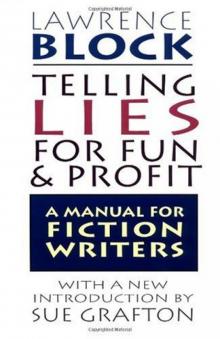 Manual For Fiction Writers
Manual For Fiction Writers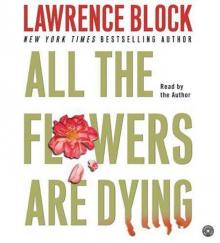 All the Flowers Are Dying
All the Flowers Are Dying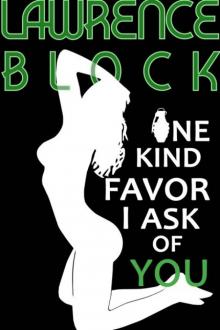 One Kind Favor I Ask of You (Kit Tolliver #8) (The Kit Tolliver Stories)
One Kind Favor I Ask of You (Kit Tolliver #8) (The Kit Tolliver Stories)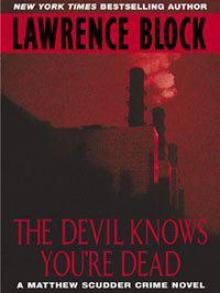 The Devil Knows You’re Dead
The Devil Knows You’re Dead Strange Embrace
Strange Embrace Clean Slate (Kit Tolliver #4) (The Kit Tolliver Stories)
Clean Slate (Kit Tolliver #4) (The Kit Tolliver Stories)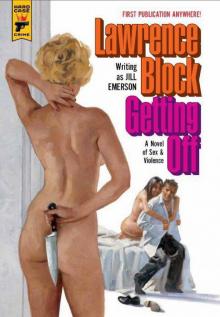 Hard Case Crime: Getting Off
Hard Case Crime: Getting Off You Can Call Me Lucky (Kit Tolliver #3) (The Kit Tolliver Stories)
You Can Call Me Lucky (Kit Tolliver #3) (The Kit Tolliver Stories) Zeroing In (Kit Tolliver #11) (The Kit Tolliver Stories)
Zeroing In (Kit Tolliver #11) (The Kit Tolliver Stories) Rude Awakening (Kit Tolliver #2) (The Kit Tolliver Stories)
Rude Awakening (Kit Tolliver #2) (The Kit Tolliver Stories) Unfinished Business (Kit Tolliver #12) (The Kit Tolliver Stories)
Unfinished Business (Kit Tolliver #12) (The Kit Tolliver Stories)